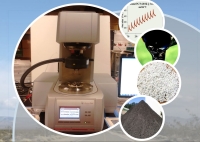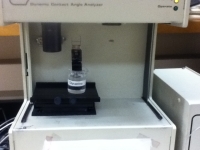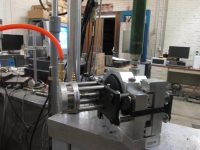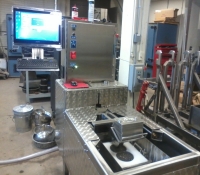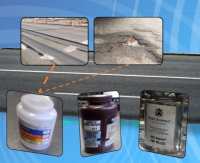Sponsor: Southern Plains Transportation Center (SPTC)
Completed: 2017
In order to sustain high traffic volume, coupled with heavier loads and extreme weather conditions in the  Southern Plains Transportation Center (SPTC) region, asphalt industries introduce polymer-modified binders (PMBs) to enhance durability and strength of asphalt pavements. For quality assurance and quality control (QA/QC) purposes, asphalt binder producers (refineries) and users (state agencies) follow the widely used dynamic shear rheometer (DSR) test method (AASHTO T 315) to capture viscoelastic properties of PMBs even though the AAHTO T 315 method is designed for unmodified asphalt binders. The recently balloted multi stress creep recovery (MSCR) test method (AASHTO TP 70) on short-term aged binders can potentially resolve this problem. The MSCR can better relate the predicted laboratory-based high temperature properties of PMBs and additive modified binders to actual rutting performance of in-service pavements. The main objective of this research was to develop simple and dynamic shear rheometer based test method that can be used as alternative to PG Plus tests (elastic recovery and force ductility) to accurately determine high temperature performance of asphalt materials. Toward meeting the objective of this study, materials (asphalt binders) from different sources in the SPTC region were collected for mechanistic evaluation. Further, Binders were also recovered from reclaimed asphalt pavement(RAP) and tested in the laboratory. In particular, multiple stress creep recovery (MSCR) tests were conducted on asphalt binder samples. The MSCR results from this study can be used to develop guidelines for the Region 6 states and implementable specifications for commonly used asphaltic materials under extreme temperature .
Southern Plains Transportation Center (SPTC) region, asphalt industries introduce polymer-modified binders (PMBs) to enhance durability and strength of asphalt pavements. For quality assurance and quality control (QA/QC) purposes, asphalt binder producers (refineries) and users (state agencies) follow the widely used dynamic shear rheometer (DSR) test method (AASHTO T 315) to capture viscoelastic properties of PMBs even though the AAHTO T 315 method is designed for unmodified asphalt binders. The recently balloted multi stress creep recovery (MSCR) test method (AASHTO TP 70) on short-term aged binders can potentially resolve this problem. The MSCR can better relate the predicted laboratory-based high temperature properties of PMBs and additive modified binders to actual rutting performance of in-service pavements. The main objective of this research was to develop simple and dynamic shear rheometer based test method that can be used as alternative to PG Plus tests (elastic recovery and force ductility) to accurately determine high temperature performance of asphalt materials. Toward meeting the objective of this study, materials (asphalt binders) from different sources in the SPTC region were collected for mechanistic evaluation. Further, Binders were also recovered from reclaimed asphalt pavement(RAP) and tested in the laboratory. In particular, multiple stress creep recovery (MSCR) tests were conducted on asphalt binder samples. The MSCR results from this study can be used to develop guidelines for the Region 6 states and implementable specifications for commonly used asphaltic materials under extreme temperature .

